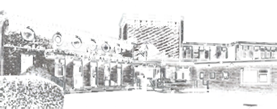Science
Science at St Peter and St Paul Catholic Primary Academy
Intent
At St. Peter and St. Paul Catholic Primary Academy, we strongly believe that high quality science education and teaching offers the foundations for understanding the world around us. Our intention is to give every child a broad and balanced science curriculum which enables them to confidently explore and discover what is around them, so that they have a deeper understanding of the world we live in.
We want our children to love science. We want them to have no limits to what their ambitions are and grow up with a desire to pursue future careers in Science. It’s for them to remember their science lessons in our school, to cherish these memories and embrace the scientific opportunities they are presented with.
To achieve this, it involves exciting, practical hands-on experiences that encourage curiosity and questioning. Our aim is that these stimulating and challenging experiences help every child secure and extend their scientific knowledge and vocabulary, as well as promoting a love and thirst for learning. The Academy has a coherently planned a sequenced curriculum which has been carefully designed and developed with the need of every child at the centre of what we do. We want to equip our children with not only the minimum statutory requirements of the National Curriculum in Science, but to prepare them for the opportunities, responsibilities and experiences of later life.
Implementation
Science comprises of four elements: Working Scientifically, Biology, Chemistry and Physics, which are taught in accordance with the National Curriculum.
- Most of our Science teaching is carried out as a discrete subject in Key Stage 1 and Key Stage 2 and cross-curricular links are made, where necessary. In the Early Years, any opportunities to explore scientific ideas through play are exploited and observations are made under the 'Understanding the World' strand.
- Topics are taught termly or half-termly to allow children to focus on developing their knowledge and skills, studying each topic in depth.
- Every year group will build upon the learning from prior year groups, therefore, developing depth of understanding and progression of skills.
- Children’s prior knowledge is considered when we plan units of work and teachers adapt the pace, challenge, and content of activities for pupils, including SEND and EAL.
- Children regularly carry out practical investigations using a range of enquiry types.
- Children present their findings and learning using science specific language, observations and diagrams.
- In order to support children in their ability to ‘know more and remember more’ there are regular opportunities to review the learning taken place in previous topics as well as previous lessons.
- At the start of each topic, children review previous learning (using mind maps) and have the opportunity to share what they already know about a current topic.
- This is used as part of an assessment and also to support children with their acquisition of knowledge and are used as a reference document at the end of the topic.
- Effective CPD and science focused staff meeting opportunities are available to ensure high levels of confidence and knowledge in our staff.
- To support teaching, teachers access a range of resources and planning from Twinkl and Hamilton Trust.
- Effective use of educational visits and visitors are planned, to enrich and enhance the pupils' learning experiences within the Science Curriculum.
- Teachers use highly effective assessment for learning in each lesson to ensure misconceptions are highlighted and addressed.
- Effective modelling by teachers ensures that children can achieve their learning intention, with misconceptions addressed within it.
- Through using a range of assessment tools, differentiation is facilitated by teachers, to ensure that each pupil can access the Science Curriculum.
- Children are given clear success criteria to achieve the learning intention with differing elements of independence.
- Pupils are regularly given the opportunity for self or peer assessment, which will then be used to inform planning, preparation, differentiation, and address misconceptions within that lesson, or for the next lesson.
- Cross-curricular links are planned for, with other subjects such as Maths, English and Computing.
- Classroom Monitor Assessment Tracker allows us to use data to inform parents and future practice.
- The profile of Science is raised through: Inter-school competitions, Science visits, Science events and community involvement.
EYFS
The Early Years Foundation Stage Curriculum supports children’s understanding of Science through the planning and teaching of ‘Understanding the World.’ Children find out about objects, materials and living things using all their senses looking at similarities, differences, patterns and change. Both the environment and skilled practitioners foster curiosity and encourage explorative play. Children enjoy spending time outdoors exploring mini-beasts and their habitats, observing the changing seasons, plants and animals. During the spring and summer months, children participate in Forest School which allows them to experience outdoor activities and interact more with nature.
Impact
The impact of this curriculum design will lead to outstanding progress over time, across the key stages, relative to a child’s individual starting point and their progression of skills. Children are expected to leave St Peter and St Paul Catholic Primary Academy reaching age related expectations or greater depth in Science and further enhance their interest in science related careers. Through various workshops, trips and interactions with experts, our science curriculum will lead pupils to be enthusiastic Science learners and understand that Science significantly impacts our lives and that it is vital to the world’s future prosperity. We want to empower our children, so they understand they have the capability to change the world. This is evidenced in a range of ways, including children’s use of scientific vocabulary with understanding, performance in competitions, their written work and their overwhelming enjoyment of science.
-
Science LTP 25-26 docx
download_for_offline
download_for_offlineScience LTP 25-26 docx






